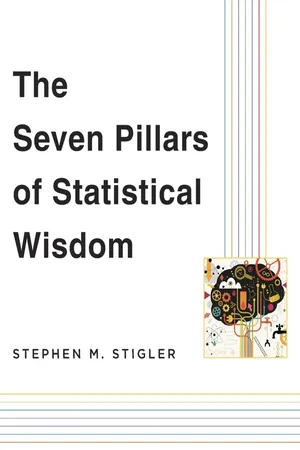
- English
- ePUB (mobile friendly)
- Available on iOS & Android
The Seven Pillars of Statistical Wisdom
About this book
What gives statistics its unity as a science? Stephen Stigler sets forth the seven foundational ideas of statistics—a scientific discipline related to but distinct from mathematics and computer science.
Even the most basic idea—aggregation, exemplified by averaging—is counterintuitive. It allows one to gain information by discarding information, namely, the individuality of the observations. Stigler's second pillar, information measurement, challenges the importance of "big data" by noting that observations are not all equally important: the amount of information in a data set is often proportional to only the square root of the number of observations, not the absolute number. The third idea is likelihood, the calibration of inferences with the use of probability. Intercomparison is the principle that statistical comparisons do not need to be made with respect to an external standard. The fifth pillar is regression, both a paradox (tall parents on average produce shorter children; tall children on average have shorter parents) and the basis of inference, including Bayesian inference and causal reasoning. The sixth concept captures the importance of experimental design—for example, by recognizing the gains to be had from a combinatorial approach with rigorous randomization. The seventh idea is the residual: the notion that a complicated phenomenon can be simplified by subtracting the effect of known causes, leaving a residual phenomenon that can be explained more easily.
The Seven Pillars of Statistical Wisdom presents an original, unified account of statistical science that will fascinate the interested layperson and engage the professional statistician.
Frequently asked questions
- Essential is ideal for learners and professionals who enjoy exploring a wide range of subjects. Access the Essential Library with 800,000+ trusted titles and best-sellers across business, personal growth, and the humanities. Includes unlimited reading time and Standard Read Aloud voice.
- Complete: Perfect for advanced learners and researchers needing full, unrestricted access. Unlock 1.4M+ books across hundreds of subjects, including academic and specialized titles. The Complete Plan also includes advanced features like Premium Read Aloud and Research Assistant.
Please note we cannot support devices running on iOS 13 and Android 7 or earlier. Learn more about using the app.
Information
Table of contents
- Cover
- Title Page
- Copyright
- Dedication
- Contents
- Introduction
- 1. Aggregation: From Tables and Means to Least Squares
- 2. Information: Its Measurement and Rate of Change
- 3. Likelihood: Calibration on a Probability Scale
- 4. Intercomparison: Within-Sample Variation as a Standard
- 5. Regression: Multivariate Analysis, Bayesian Inference, and Causal Inference
- 6. Design: Experimental Planning and the Role of Randomization
- 7. Residual: Scientific Logic, Model Comparison, and Diagnostic Display
- Conclusion
- Notes
- References
- Acknowledgments
- Index